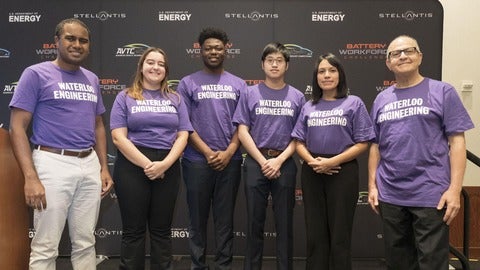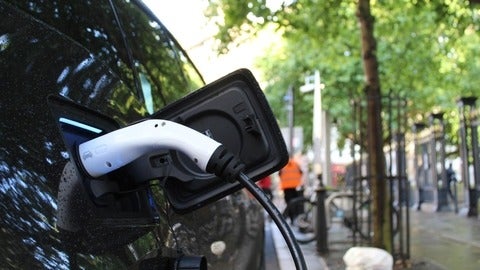
Through collaborative and interdisciplinary research on electrochemical energy storage and conversion materials and systems, The Ontario Battery and Electrochemistry-research Centre (OBEC) researchers aim to create sustainable energy solutions for transportation, residential and industrial applications.

OBEC researchers are examining the design and function of advanced materials to enhance the following electrochemical energy storage technologies:
- Batteries
- Fuel cells
- Supercapacitors
- Hydrogen production and storage
- CO2 capture and conversion
- Sensors
Professor Yverick Rangom's research interests
Professor Michael Pope's Research Interests
Professor Michael Pope's collaboration with e-Zinc
News
Breakthrough in EV battery technology pushes the limits of fast charging
Researchers at the University of Waterloo have developed a groundbreaking new battery architecture that enables extreme fast charging of lithium-ion batteries for electric vehicles (EVs). The innovation paves the way for drivers to consistently charge EVs from zero to 80% in under 15 minutes, a significant improvement from the current industry standard of fast charging which takes nearly an hour and can result in significant degradation of the batteries when done frequently.
Batteries made using this new strategy were shown to undergo 800 extreme fast charging cycles at room temperature, a feat not possible with current EV batteries which limit charging times to prevent degradation and must heat the battery pack to a suitable temperature to be able to charge at maximum rate.
Jeff Gostick is awarded a Fellowship from the Japan Society for the Promotion of Science
Professor Jeff Gostick was awarded the 2023 Japan Society for the Promotion of Science Fellowship. The Japan Society for the Promotion of Science (JSPS) offers programs that allow exceptional international researchers to engage in collaborative research with researchers in Japan. This enables discussion and an exchange of ideas.
Chemical Engineering professors make the 2023 Highly Cited Researchers list
Three Department of Chemical Engineering professors have been named to the 2023 list of Highly Cited Researchers. They are recognized as innovative researchers who demonstrate significant and broad influence in their field(s) of research.
Transforming CO2 into valuable products
An interdisciplinary research team from the University of Waterloo aims to tackle CO2 emissions in the value chain by transforming CO2 into valuable chemicals needed by industry.
Supported by BMO, the research focuses on the use of green hydrogen to capture CO2 from power plants as well as the iron, steel, and cement industries, and convert it into useful gases via reverse water gas shift reaction.
Students compete to advance EV power
A team from the University of Waterloo has won a place in the Battery Workforce Challenge. It is a new three-year student competition that launches in fall 2023 to challenge universities from across North America to design, build, test and integrate an advanced electric vehicle (EV) battery pack in a Stellantis vehicle. The first year of the competition focuses on the design of the battery pack, the second year on the implementation of the design, and the final year on working to integrate the battery pack into a Stellanis vehicle.
Paving the way for electric vehicle adoption
As automobile manufacturers continue their pivot to electric vehicles (EVs), the days of the internal combustible engine are ending — and sooner than you think. In Canada, the sale of new gas-powered vehicles will end in 2035. South of the border, the U.S. is set to end the sale of new gas-powered light vehicles as early as 2025.





